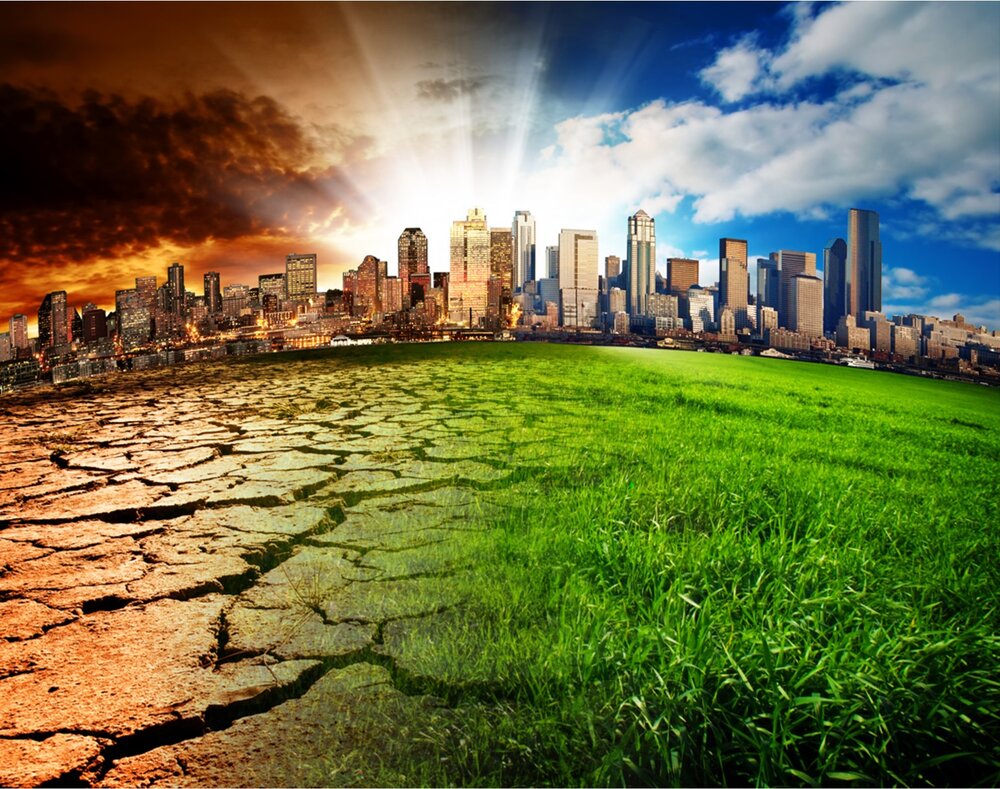Climate change induced increases in temperatures, rainfall variation and the frequency and intensity of extreme weather events are adding to pressures on global agricultural and food systems. The changing climate is also adding to resource problems, such as water scarcity and soil degradation.
Climate change impact
While agriculture is a victim of climate change, it also contributes to it. The main direct agricultural greenhouse gas (GHG) emissions are nitrous oxide emissions from soils, heavy tillage, Nitrogen fertilisers and manure from grazing animals; and methane(CH4) production by ruminant animals and from paddy rice cultivation. Both gases have a significantly higher global warming potential than carbon dioxide.

Paris Agreement
The Paris Agreement is a legally binding international treaty on climate change. It was adopted by 196 countries at COP 21 in Paris, on 12 December 2015. Delegates from more than 200 countries met in Paris in 2015 and set a goal to limit temperature rise to 1.5℃ above pre-industrial levels by 2050.
The Paris Agreement is a landmark in the multilateral climate change process because, for the first time – brings all Nations into a common cause to undertake ambitious efforts to combat climate change and adapt to its effects, with enhanced support to assist developing countries to do so. As such, it charts a new course in the global climate effort.
The Paris Agreement provides a framework for financial, technical and capacity building support to those countries who need it.
Our Organization Role In this Scenario
We build our climate action programs around the thematic areas of Sustainable Agriculture,Organic Farming, INTEGRATED MULTI PURPOSE AGRO FORESTRY SYSTEM (IMPAFS), Social Forestry, Water Management, Waste Management(Wealth of waste) and Access to Energy.
Our agriculture programs facilitate sustainable natural resource utilization and equitable access and sharing of financial resources. With our climate resilience approach, our focus is on improving market linkages and access to finance for small, medium and marginal farmers, which are critical factors to stimulate livelihood and sustainability, enhancing investments in agriculture.

Our Activities Under This Project
- Identify small and marginal farmers scientifically. Empowering rural communities towards climate action & sustainable development.
- Provide advice and training in Agro forestry based cultivation, Soil Conservation,best plantation practices and use of environmental friendly technologies by Our organization Technical experts.
- Arrange seedlings produced from Seeds, Air layering method or Grafted technology to the farmers to raise high density as well multiple plantations.Promote farmer-industry partnerships with buy back arrangements to purchase Pulp-paper, Timber and Non tember wood Species.
- Encourage farmers to go for agro-forestry practices such as inter-cropping during the first year to meet their subsistence costs.Generate additional income from carbon credit to the farmers.Develop and strengthen the capacity of small and marginal farmers, SHG Groups, govt, Farmers Community, FPOs and NGOs.
- To enhance their negotiation skills to take advantage of the international mechanisms.Conservation of biodiversity through reduced dependence on natural forests Production of raw material to the paper, plywood and Perfume Industry locally thereby reducing the cost of transportation and consumption of fossil resulting in reduced emissions.
- Saving of valuable foreign exchange by producing wood and non wood for perfume and construction industry and thereby reducing the dependence on timber imports. Development of suitable agro forestry models through research in collaboration with Govt institutions and private organization.
- We have also been able to engage businesses in addressing issues of social responsibility and environmental sustainability along their supply chain and more recently, to engage upon climate action projects in line with the Paris Agreement and the Sustainable Development Goals ( UNO SDG GOALS ).
SUSTAINABLE AGRICULTURE
Integrated Multi Purpose Agro Forestry system (IMPAFS) is a our main moto.
Sustainable agriculture frequently encompasses a wide range of production practices, including conventional and organic. We are encouraged A regionally integrated system of Food,Fodder, Fruit &Forest plant and animal production practices are designed to produce long-term results in Agro forestry based sustainable Agriculture System.
Importence of this system:
- Production of sufficient human food, feed, fiber, and fuel to meet the needs of a sharply rising population
- Protection of the environment and expansion of the natural resources supply.
- Sustainable of the economic viability of agriculture systems
- Increase profitable farm income
- Promote environmental stewardship
- Enhance quality of life for farm families and communities
- Increase production for human food and fiber needs
- Using a multidisciplinary approach, our water access and management programs encompass varied themes of water solutions for agriculture.
- Engage farmers and ranchers in the development and adoption of practices that are profitable and environmentally sound.
- Support research and education intended to help farmers and ranchers mitigate and adapt to climate change
- Improve production efficiency, productivity, and profitability
- Address threats from pests and diseases
- Improve the quality of surface water and groundwater resources Our Organization Encourage and motivate Agro forestry based Sustainable agriculture programs facilitate sustainable natural resource utilization and equitable access and sharing of financial resources. With our climate resilience approach, our focus is on improving market linkages and access to finance for small, marginal farmers, which are critical factors to stimulate livelihood and sustainability, enhancing investments in agriculture.
AFFORESTRATION & REFORESTATION
Reforestation is the process of increasing trees in an existing forest, while afforestation /Social Forestry is the process of creating a new forest.
In this project We are Integrating community forest management with reviving degraded land and indigenous species through afforestation, conservation & assisted natural regeneration.
In today’s world, the rate at which trees grow naturally in forests is much slower than the rate at which trees in forests are being cut down for production. The increased demand for tree products has put pressure on forests resulting in deforestation.
Afforestation is helping alleviate the pressure on natural forests by providing an alternative source of tree products. It is mostly done for commercial purposes.
- Afforestation is helping alleviate the pressure on natural forests by providing an alternative source of tree products. It is mostly done for commercial purposes.
- Afforestation has been one of the hot topics concerning global warming. Global warming and climate have dominated the world due to its major implications our planet has starting to face.
- Politicians, leaders, individuals,NGOs, organizations and governments have campaigned heavily for ways to reduce the effects of climate change and global warming. Afforestation and Reforestation are two of the most brought up topics when it comes to solutions to global warming.
- Afforestation is of high importance to ensure continued sustainability of our planet and here we will look at the importance, advantages, disadvantages and even major efforts of Afforestation.
- Afforestation allows people to plant tree species more in demand so that they can be supplied to customers requiring it for various purposes.
- Afforestation helps to develop and restore long lost ecosystem areas.They also help to increase species biodiversity within those regions
Advantages of Afforestration:
- A constant supply of forest products.
- Prevents soil erosion.
- Stabilizes the climate.
- Has the potential of reversing global warming and climate change.
- Better quality air.
- Improve watershed.
- Preservation of wildlife.
- Provision of employment and economic opportunities. Our Organization Mainly Focusing on Integrating community forest management with reviving degraded land and indigenous species through afforestation, conservation & assisted natural regeneration. Our social forestry programs lay powerful impetus for creating carbon sinks while creating alternate livelihood opportunities for the forest communities. Focusing strongly on monitoring land-use changes.


















